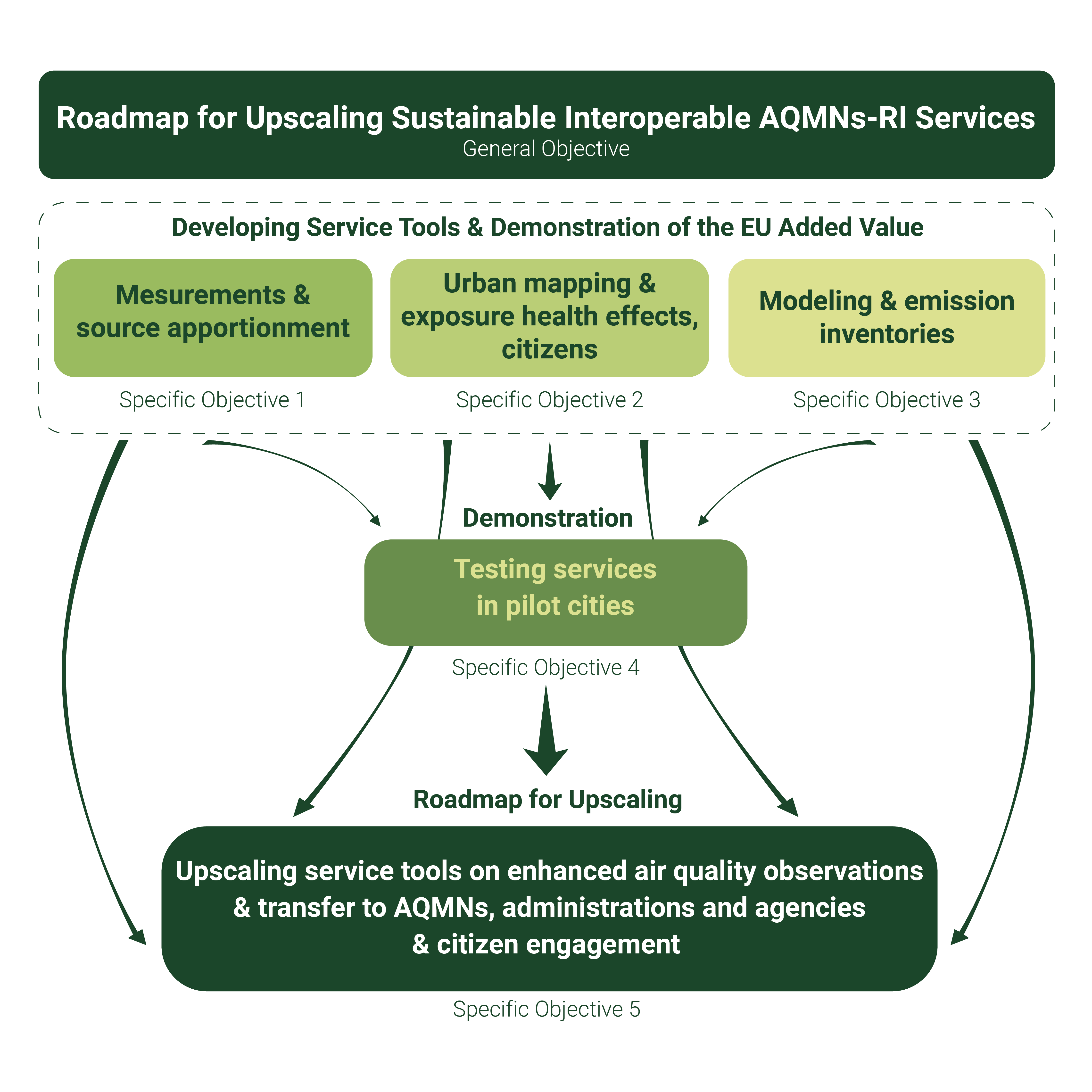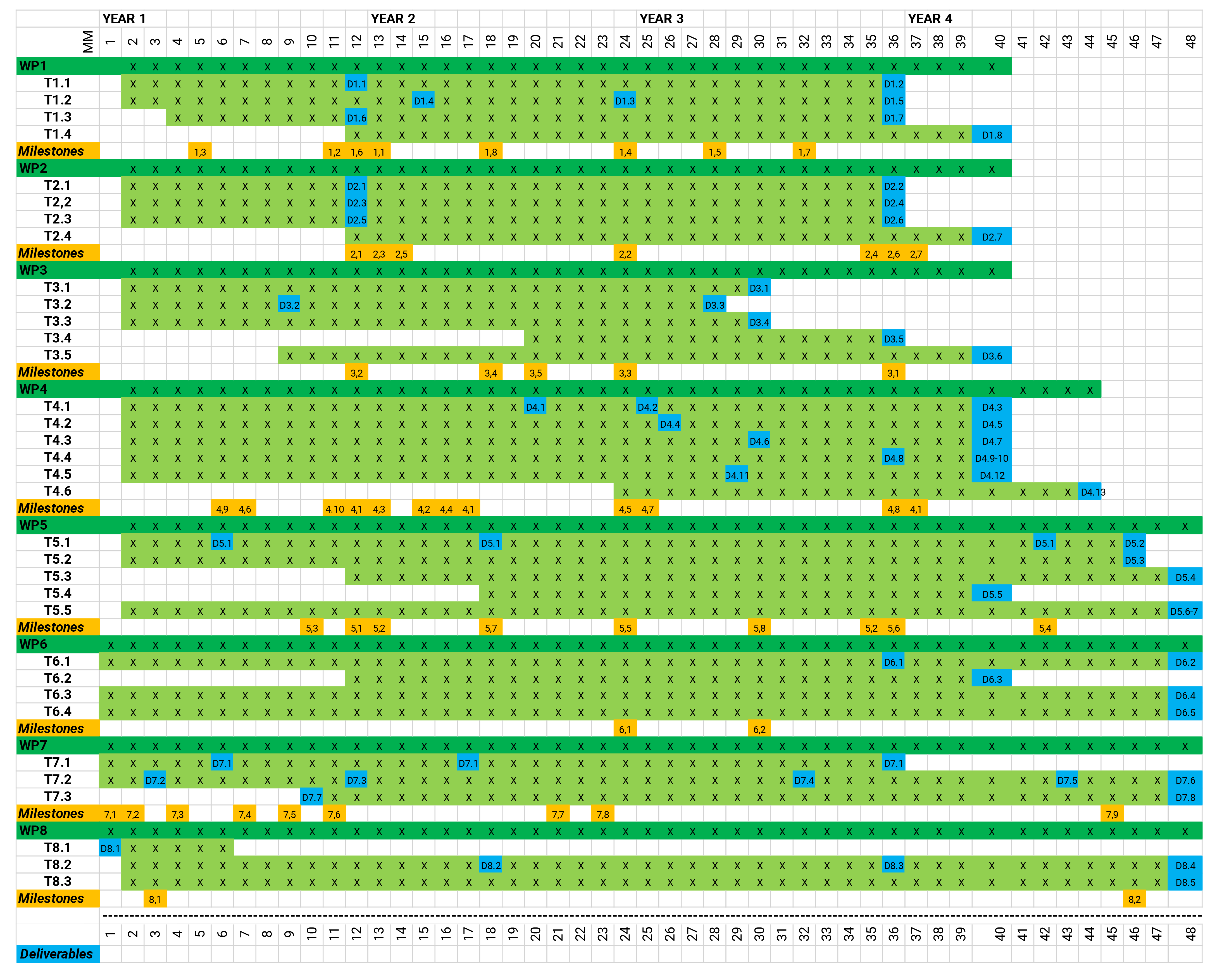RI-URBANS at a glance
Improving air quality with research
Our goal is to develop an air quality monitoring system that complements those that are currently available. Identifying and measuring the changes in air pollutants will allow European health administrations and agencies to effectively mitigate the impact of poor air quality on human health.
Our specific concerns include two hazards that have increasingly contributed to poor air quality in recent years – nanoparticles and particulate matter fractions in the air.
Why RI-URBANS?
Atmospheric pollution is the fourth cause of premature mortality in 2019, according to the recent evaluation of the Global Burden of Disease 2020. The global costs associated with air pollution by particulate matter were estimated at 4.5% Gross Domestic Product by the World Bank 2016. In Europe, the European Environmental Agency recently reported almost 0.4 million premature deaths in EU during 2018. Due to the success of European Air Quality policy this number has reduced dramatically since 1990, when as many as 1.0 million premature deaths were estimated to have been caused by poor air quality.
The significant efforts in Europe to abate air pollution have remarkably improved urban air quality, to the extent that, in the last decades, ambient levels of several pollutants decreased markedly (by more than 80% in the case of SO2). For other pollutants such as NO2 and particulate matter, the decrease reached 30-50%, especially from 2000 to 2010, but much less since then, and for O3, NH3, and Benzo[a]Pyrene, the decrease was very small or negligible. The last report of the European Environmental Agency shows that in 2018 large proportions of the EU urban population were exposed to NO2, PM10, PM2.5, and O3 levels exceeding the respective current WHO air quality guidelines.
Changes in emissions in the last decades prompted new urban pollution patterns to be considered in new policy developments and health impact studies.
Objectives
The RI-URBANS’ main objective is to demonstrate how service tools from atmospheric research infrastructures can be adapted and enhanced in air quality monitoring networks in an interoperable and sustainable way.
We want to better address the challenges and societal needs related to air quality in European cities (and industrial, harbour, airport, and traffic hotspots).
This project responds to the urgent need to substantially reduce air pollution across the EU and to engage in a strategy to evaluate the health impacts of air pollution on citizens.
RI-URBANS is based on the premise that advanced monitoring and modelling tools developed in research infrastructures, by air quality experts and advanced monitoring networks can be used to supplement current networks of regulated pollutants.

Service Tools
RI-URBANS provides 16 advanced Service Tools to meet the demands of new and complex urban air quality scenarios and enhance the analysis of air quality.
A Service Tool (ST) is any tool that RI-URBANS has reviewed, tested, and recommended for urban areas. These tools can be used to assess air quality in accordance with RI-URBANS’ advanced air quality monitoring recommendations. These recommendations include protocols for measuring advanced air quality parameters (derived from ACTRIS and CEN or, in specific cases, proposed when not available), mapping protocols, emission inventories, modelling tools, and suggested epidemiological approaches to evaluate the health effects of new pollutants. Clear procedures for using the Service Tools will be provided to the users.
Explore all our advanced Service Tools for optimised urban air quality management:
.
Table 2. List of Service Tools (STs). Click on the blinking green circles for a brief description of each ST. Then, scroll down to the list below the table to download the related documents.
Note: The summery booklet and the first six STs are also available in Spanish
.
.
The pilots
RI-URBANS will implement 5 pilot studies in 9 selected European cities (Athens, Barcelona, Birmingham, Bucharest, Helsinki, Milan-Bologna, Paris, Rotterdam-Amsterdam, and Zurich) for testing and demonstrating services. These selected European cities represent different air quality environments.
They combine the ability to perform advanced long-term air quality observations and the commitment of the local and/or regional monitoring networks to benefit from the corresponding pilot actions. The former provides the reference to the new air quality observations-metrics to be evaluated and for which their association with health outcomes will be compared with that obtained for conventional metrics. The latter ensures the sustainability of the pilots beyond this project’s lifetime.
A pilot aims to demonstrate on a real scale the ability of air quality research infrastructures to integrate complementary measurement systems and methods, but also the effectiveness of integrating different components of an urban observing system for air quality studies.
Workpackages
Our take on addressing new air hazards
RI-URBANS is organised into 9 Work Packages (WPs) built within the 4 Strategic Pillars.
Three WPs (WP1-3) will focus on providing a landscape analysis, collecting and compiling data from past initiatives, and developing advanced service tools for improving air quality monitoring, in particular for addressing the nanoparticle impact on human health.
WP4 will demonstrate through several pilot studies the application of innovative tools in different urban environments. WP5-6 will provide a roadmap for upscaling.
WP7 will support the internal and external communication and outreach of RI-URBANS, and WP8 the coordination and management of the project. Finally, a WP 9 will cover all issues related to ethics, according to the requirements of the European Commission.
Workflow
Our take on addressing new air hazards
All RI-URBANS tasks are arranged on different work packages (WP) by the European Union. The WP are sorted by topic, not chronologically, to help us mark our goals on each group of tasks.
Innovation
In the course of transferring advanced observation and modelling tools from the research infrastructures to air quality monitoring networks and implementing them successfully into the associated operational framework, research is needed and innovation will be created across many parts of the project.
Our key ambitions on innovation:
SMEs interaction
RI-URBANS interacts with SMEs related with AQ instrumentation and management. Some of the companies approached by RI-URBANS attended the scientific meetings, most of them face-to-face. Among these, INOESY, AIRMODUS, TSI and PALAS, as well as Coccosphere became Associated Collaborators .
Collaboration with SMEs is of great interest, given the requirements of the new Air Quality Directive 2024/2881 for the measurement of emerging pollutants, such as ultrafine particles, black carbon and elemental carbon, as well as ammonia and the oxidative potential of particles, to support the scientific understanding of their effects on human health and the environment. The implementation of new supersites and the mandatory measurement of ultrafine particles in air pollution hotspots, as required by Directive 2024/2881/EC, will require the acquisition of reference or equivalent instruments by air quality monitoring networks.
The importance of providing reference measurement methods for these new metrics is recognized. RI-URBANS developed service tools, many using cutting-edge technologies, for measuring emerging contaminants. We provide guidance to stakeholders on how to implement them.
The linked document shows the interactions of RI-URBANS with SMEs to support the implementation of new technologies for measurements and source apportionment.
Engagement with stakeholders
RI-URBANS counts with a Stakeholder Board, which is integrated by a representative from the nine major air quality monitoring networks involved in the
pilots, and from experts of the European Environment Agency, the World Health Organization, the World Meteorological Organization, and the European Monitoring and Evaluation Programme.
Their major role is to enhance the participation and interaction with the monitoring networks involved in the project and the major agencies related to air quality and health, specifically to comment on the RI-URBANS pilot development, pilot outcomes, data products, and their interoperability.
Management structure
Ensuring an effective implementation of the project
The RI-URBANS management structure and bodies are devised to:
- Coordinate and manage the project activities in administrative, technical, and financial terms.
- Ensure the quality of the project outcomes, implementing internal and external review processes.
- Assess and mitigate the project-related risks and troubleshoot arising problems.
- Ensure communication between the consortium and the European Commission, and between the project partners.
Ensuring equal-opportunity recruitment
RI-URBANS adopts several strategies in the recruitment, selection, and career progression processes to ensure that women and men get equal chances to develop and advance their careers.
Gantt Chart
Check out the RI-URBANS project workflow that depicts start-end months for WPs and tasks, and expected delivery months for deliverables and milestones.


